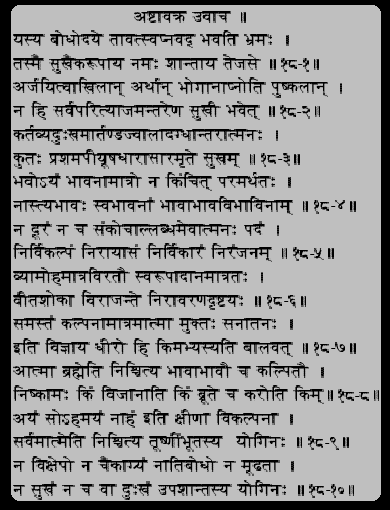


ब्रह्म
बोध के उदय पर,सब भ्रान्ति स्वप्न सी शेष हो,
उस तेजोमय आनद ब्रह्म को नमन मेरा विशेष
हो.------१
बहु
संपदा को जोड़ करके, भोग मानव भोगता,
पर त्याग वृति के बिना, नहीं सत्य सुख की
योग्यता.----२
कर्मजन्य
विषाद रूपी, रवि से अंतर्मन जला,
शान्ति रूपी अमिय धारा, के बिना क्या सुख
भला.-----३
परमार्थ
में आत्मा ही सत्य है, जगत भ्रान्ति भाव है,
भावाभाव विभाव में स्वभावों का ही अभाव है.------४
यह सत्य
पड़ न तो दूर न संकोच से हीप्राप्त है,
निर्विकल्पी, निर्विकारी, दोषहीन है आप्त
है.-------५
उपरांत
मोह निवृति पर ही, निज स्वरुप का भान हो,
वीतरागी, पारदर्शी जन की शोभा, मान हो.-----६
मुक्त और
सनातन आत्मा, है जगत केवल कल्पना,
यह जान बालक की तरह अज्ञान- है क्यो अनमना ...७
यह आत्मा
ही ब्रह्म भाव, अभाव है परिकल्पना,
यह जान जन निष्काम की, क्या कर्म की संकल्पना
.-----८
यह मैं
हूँ और मैं यह नहीं की, कल्पनाएँ विदीर्ण हों,
आत्मा हैं एकत्व बोध से, तत्व ज्ञान प्रकीर्ण
हो----९
शुभ शांत
योगी के लिए, विक्षेप है न एकाग्रता,
सुख दुःख बोध न मूढ़ता है, और न ही व्यग्रता
----१०

Ashtavakra said:
Praise be to
That by the awareness of which delusion itself becomes
dream-like, to that which is pure happiness, peace, and light. 18.1
One may get
all sorts of pleasure by the acquisition of various
objects of enjoyment, but one cannot be happy except by the
renunciation of everything. 18.2
How can
there be happiness, for one who has been burnt inside
by the blistering sun of the pain of thinking that there are things
that still need doing, without the rain of the nectar of peace? 18.3
This
existence is just imagination. It is nothing in reality, but there is
no non-being for natures that know how to distinguish
being from nonbeing. 18.4
The realm of
one's self is not far away, nor can it be achieved by the
addition of limitations to its nature. It is unimaginable, effortless,
unchanging, and spotless. 18.5
By the
simple elimination of delusion and the recognition of one's
true nature, those whose vision is unclouded live free from sorrow. 18.6
Knowing
everything as just imagination, and himself as eternally free,
how should the wise man behave like a fool? 18.7
Knowing
himself to be God, and being and non-being just imagination,
what should the man free from desire learn, say, or do? 18.8
Considerations like "I am this" or "I am not this" are finished for the
yogi who has gone silent realising "Everything is myself." 18.9
For the yogi
who has found peace, there is no distraction or
one-pointedness, no higher knowledge or ignorance,
no pleasure and no pain. 18.10
[Translation by John Richards]